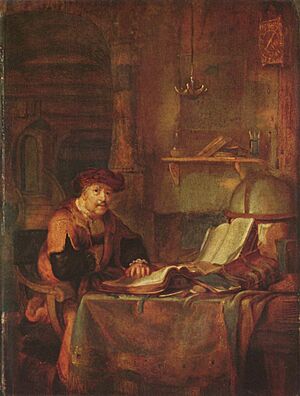Scholarly method facts for kids
Scholarship is how experts, often called scholars or academics, find and share new knowledge. It's all about making sure their ideas and discoveries are true and can be trusted. They use special ways of working to do this.
Scholarship helps improve teaching, research, and how things are done in different fields of study. It needs careful checking and can be looked at by other experts. This process helps make sure the information is strong and reliable. Two main parts of scholarship are the scientific method (used by scientists) and the historical method (used by historians).
Contents
What is Scholarship?
Scholarship is like a set of rules and ways of doing things that smart people use. These people, called scholars, work in universities and research centers. Their main goal is to find out new things and share them with others. They want to make sure their information is correct and can be trusted.
When scholars do their work, they follow certain steps. These steps help them make sure their findings are strong and well-supported. It's a bit like being a detective, but for knowledge!
How Scholars Do Their Work
Scholars use different methods depending on what they are studying. For example, a scientist might do experiments. A historian might read old letters. But all scholars try to be very careful and check their work.
They also share their work with other experts. This is called "peer review." Other experts read their findings and give feedback. This helps make sure the work is as good as it can be. It also helps spread new knowledge to everyone who needs it.
The Historical Method
Historians are like time travelers who study the past. They use the historical method to find out what happened long ago. This method helps them look at old documents, pictures, and other clues. These clues are called "primary sources."
Historians carefully check if these sources are real and what they truly mean. They ask questions like: "Is this document really from that time?" and "What was the person who wrote this trying to say?" After gathering all the information, they put it together to write history. This helps us understand how the world became what it is today.
The Scientific Method
The scientific method is a way for scientists to learn about the world. It involves asking questions and then trying to find answers. Scientists do this by watching things carefully and doing experiments.
Here are the main steps:
- Ask a question: Like "Why does this plant grow faster?"
- Do research: Find out what others already know.
- Form a hypothesis: Make an educated guess about the answer. For example, "Maybe the plant grows faster with more sunlight."
- Test with an experiment: Design a test to see if your guess is right.
- Collect data: Write down what happens during the experiment.
- Analyze data: Look at the results to see what they tell you.
- Draw a conclusion: Decide if your hypothesis was right or wrong.
- Share results: Tell other scientists what you found.
This method helps scientists get new knowledge that is based on facts and can be checked by others.
Learning from Experience (Empirical Method)
The empirical method is about collecting information by observing things. It's like gathering facts to help you make a guess or come to a conclusion. This method is a big part of the scientific method.
For example, if you want to know how many birds visit your feeder, you would watch it and count them. That's using the empirical method. It's about learning directly from what you see and experience.
Testing Ideas (Experimental Method)
The experimental method is a special way to test if one thing causes another. Scientists use experiments to see how different things affect each other. For example, they might change one thing (like the amount of water a plant gets) to see if it changes another thing (like how tall the plant grows).
Experiments are very important in both natural sciences (like biology) and social sciences (like psychology). They help us solve problems and check if our ideas about how the world works are true.
See also
- Academia
- Academic authorship
- Academic publishing
- Discipline (academia)
- Doctor (title)
- Ethics
- History of scholarship
- Professor
- Source criticism
- Wissenschaft


